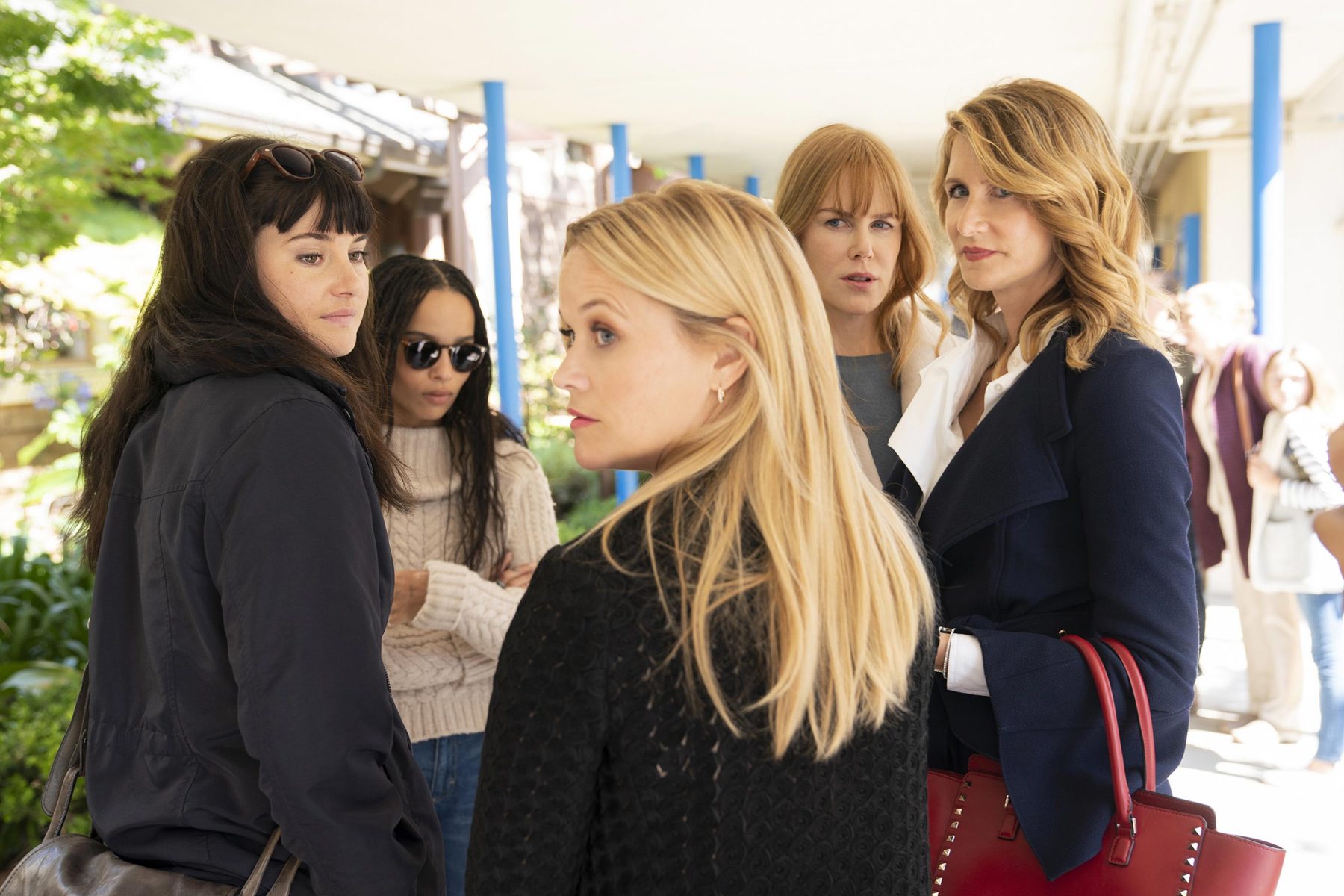Shots of water rushing up against the stone of California beaches flicker on screen. Moms drop off their schoolchildren in expensive minivans. The local elite retreat into their flashy beachfront million-dollar mansions. Parents feud, subtly trash talking, while their children are pawns in the mom politics of elementary school. All the trademarks of “Big Little Lies” are present in the second season of the incredibly popular limited series.
https://www.youtube.com/watch?v=eCWevZV945M
While the series has never had higher ratings and remains highly relevant on Twitter, audiences and critics have been disappointed by the second season of “Big Little Lies.” Despite “Big Little Lies” bringing back many of the beloved aspects of the show, the second season has been met with mixed reviews, critical reception waning as the series approaches the finale.
“Big Little Lies” still delivers quality drama, emotional tension and remarkable performances from the series’s five lead actresses, especially newcomer Meryl Streep. Yet the tendency of head writer David E. Kelley to draw parallels between the two seasons dilutes the impact of the follow-up since the recently released content cannot separate itself from the looming success of Season 1.
Accompanying on-screen problems of “Big Little Lies” are tensions behind the scenes at HBO. Since the director of Season 1, Jean-Marc Vallée, was busy with “Sharp Objects,” HBO hired Andrea Arnold to take control the second time around. Yet, in post-production, HBO let Vallée take control once again, chopping up Arnold’s original cut.
HBO President Casey Bloys denies wrestling creative control from Arnold, calling rumors “misinformation” because apparently the network never promised that much to the “American Honey” director in the first place.
If Bloys’ statement is true, then why bother letting Arnold take the reins in the first place if HBO did not want someone to “come in and completely redo things”? From watching the aired version of “Big Little Lies” it is clear that HBO did not want to change anything about the series.
Many critics and fans of the Emmy-winning show doubted whether a second season needed to be made at all. The plot points were wrapped up perfectly in a brilliant Season 1 finale that ended with Bonnie shoving the abusive Perry to his death.
The first season followed Liane Moriarty’s novel “Big Little Lies” closely, so creating a second season always meant pushing beyond the source material, something HBO has struggled with in other series such as “Game of Thrones.” Season 2 of “Big Little Lies” happened because an unexpectedly rabid fan base demanded more content and because of the awards and revenue HBO garners as a result.
https://www.instagram.com/p/B0lVIU4JKVz/?utm_source=ig_web_copy_link
With a first season that felt complete, a follow up was always going to feel like an artificial attempt to extend the narrative. The first season’s greatness looms over the sequel, an idol the follow up cannot live up to.
The primary issue with “Big Little Lies” Season 2 is that most of the storylines are merely passive responses to actions taken in Season 1. Mainly, it is a reaction to Perry’s death without overcoming the incident and developing new storylines that function on their own.
Celeste’s custody battle, which is the primary storyline of Season 2, stems entirely from Perry’s death, as do Madeline’s relationship struggles with Ed that stem from her infidelity last season. Perhaps both of these stories would have felt more satisfying if Celeste or Madeline actually grew from them.
“Big Little Lies” Season 2 focuses on Celeste’s storyline, leaving the rest of the Monterrey Five on the sidelines, relegated to their own side plots. Madeline is left to rebuild her marriage with Ed. Renata rages off screen at her buffoonish husband, who lost all of their money, in a storyline focusing on her anger at her husband rather than exploring how she can earn her way back to the top without him since she is a CEO.
Jane is courting a new boyfriend named Corey (instead of Tom, who completely disappeared without any explanation) in a relationship that feels rushed. Meanwhile, Jane’s journey of self-healing is an afterthought, and questions about how she is impacted by Mary Louise’s victim blaming or her struggles with raising Ziggy in the context of her truth are unexplored.
The series shows Celeste’s journey of overcoming trauma but not Jane’s. Further, Bonnie’s plot is the most isolated and is done the most disservice. As one of the few people of color in Monterrey, the series never once asks about how the reality of existing in a space of whiteness impacts Bonnie’s feelings on her marriage, raising her daughter and her own trauma from pushing Perry, except in an improvised line by her mother (Crystal Fox).
However, “Big Little Lies” did decide to explore one aspect of Bonnie more, presenting the powerful idea that, when she shoved Perry, she was combating her own past history of abuse. Yet, the isolation of this plot, the little relevance it has on other characters, the minimal screen time it has and the fact that one of the two women of color on “Big Little Lies” is an abuser makes a potentially amazing storyline feel like unwanted exposition.
The isolation of all the plotlines in Season 2 also make their sudden reunion and subsequent confession to the police feel forced. “Big Little Lies” thrives on the interactions between the five lead actresses, so isolating them weakens the series. It is unsurprisingly its best when the actresses can work together.
Each of the isolated storylines also feel like a checklist. Fans love when Renata rages in Season 1, so recent episodes make sure to have at least one meme-worthy meltdown in repetitive scenes. The show has Streep so it has to use her no matter how many scenes exist where the older woman has a war of niceties with the younger moms.
The series feels as though is trying to imitate itself, focusing on scenes that are almost fan service and can be made into GIFs, without ever delving deeper or expanding beyond the death of Perry.
Yet despite the limited series’ shortcomings, “Big Little Lies” Season 2 is still pretty great and a very entertaining watch. Streep is amazing and will certainly win an Emmy. All of the performances, especially from the Monterrey Five, are spectacular.
The suburban world of Monterrey is still entrancing to viewers. However, the atmosphere and juicy add-ons are a lot of what Season 2 has to offer. In many ways, it’s as empty on the inside as the life of one of the immensely wealthy residents of Monterrey.
















